|
|
|
Sort Order |
|
|
|
Items / Page
|
|
|
|
|
|
|
| Srl | Item |
| 1 |
ID:
182995


|
|
|
|
|
| Summary/Abstract |
The January 6 attack was unique in its target and potential consequences. But the methods employed were common in the 5th Wave where far-right demonstrations became common. They began against President Obama and were then encouraged by President Trump. The article examines those demonstrations, the participants, methods, and the difficulties government forces have had in dealing with them.
|
|
|
|
|
|
|
|
|
|
|
|
|
|
|
|
| 2 |
ID:
027681
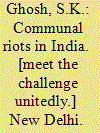

|
|
|
|
|
| Publication |
New Delhi, Ashish Publishing House., 1987.
|
| Description |
XVI, 230p.
|
| Standard Number |
81-7024-087-5
|
|
|
|
|
|
|
|
|
|
|
|
Copies: C:1/I:0,R:0,Q:0
Circulation
| Accession# | Call# | Current Location | Status | Policy | Location |
| 028251 | 303.623/GHO 028251 | Main | On Shelf | General | |
|
|
|
|
| 3 |
ID:
115069
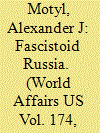

|
|
|
|
|
| Publication |
2012.
|
| Summary/Abstract |
The massive demonstrations that rocked Russia in the aftermath of the Duma elections of December 4, 2011, surprised everyone, including most Russians. But they shouldn't have. The conditions for such an upheaval have been ripening as a result of the growing power and decrepitude of Putinism. It is likely that popular mobilization will continue, and that the regime's days may be numbered.
|
|
|
|
|
|
|
|
|
|
|
|
|
|
|
|
| 4 |
ID:
027690
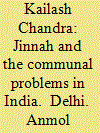

|
|
|
|
|
| Publication |
DelhI, Anmol Publications, 1986.
|
| Description |
v, 277p.: ill.hbk
|
|
|
|
|
|
|
|
|
|
|
|
Copies: C:1/I:0,R:0,Q:0
Circulation
| Accession# | Call# | Current Location | Status | Policy | Location |
| 026400 | 954.9045/KAI 026400 | Main | On Shelf | General | |
|
|
|
|
| 5 |
ID:
133930
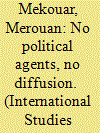

|
|
|
|
|
| Publication |
2014.
|
| Summary/Abstract |
Following the Tunisian revolution of 2011, Arab countries witnessed different degrees of revolutionary diffusion. While some countries experienced a process of advanced diffusion, others experienced more limited forms of emulation. This paper examines the process of regional diffusion that occurred in North Africa during the first half of 2011 to show that shifts by local political agents explain these differences. Using the rich literature of informational cascades, this paper investigates the cases of Algeria, Egypt, Libya, and Morocco to demonstrate that in all four countries, local political agents actively nourished or hindered the process of revolutionary diffusion that followed the Tunisian revolution. In Egypt, the strong involvement of upper-middle-class youth traditionally close to the regime signaled to the general population the presence of a historical opportunity for contestation and helped precipitate the 2011 revolution. The same logic occurred in Libya where defections of important senior members of Gadhafi's regime signaled to the Libyan population that major local actors were also dissatisfied with the leadership of the country. In contrast, major actors in Algeria and Morocco refused to mobilize against their respective governments, thus depriving nascent local demonstrations of both the visibility and the resources necessary for the inception of an informational cascade. Without a shift from local political agents, the process of regional diffusion came to an abrupt end in these two countries.
|
|
|
|
|
|
|
|
|
|
|
|
|
|
|
|
| 6 |
ID:
124815
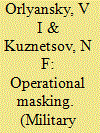

|
|
|
|
|
| Publication |
2013.
|
| Summary/Abstract |
The authors put forward their ideas on ways to expedite operational masking and improve its quality, and to develop hardware and software tools enhancing its efficiency.
|
|
|
|
|
|
|
|
|
|
|
|
|
|
|
|
| 7 |
ID:
130863


|
|
|
|
|
| Publication |
2014.
|
| Summary/Abstract |
A 'yes' vote, though unlikely, would fundamentally alter the British Isles, and potentially Europe as well. A routine parliamentary afternoon in the United Kingdom: under debate are final amendments to a bill designed to improve advice given to people in debt and to adjust the terms for those who fall into bankruptcy. A government minister, Fergus Ewing, speaks enthusiastically of a financial National Health Service. With matching spirit, his Labour Party opponent, Jenny Marra, attacks some measures as too harsh on bankrupt debtors. A division is called on her proposed amendments, and the number of members in the chamber quickly swells to more than 100 for the votes. The government wins them easily. However, in a remarkable display of consensus politics, the opposition parties, both Labour and the Conservatives, then support the bill, and it is duly passed.
|
|
|
|
|
|
|
|
|
|
|
|
|
|
|
|
| 8 |
ID:
173810
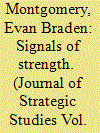

|
|
|
|
|
| Summary/Abstract |
States often use demonstrations to improve perceptions of their military power. This topic has received limited attention in the literature, which typically assumes that states disguise or downplay their capabilities, advertise them only to enhance their prestige, or use demonstrations to communicate interests and resolve. Because military strength can be difficult to gauge, however, successful deterrence and assurance can require demonstrations to ensure that capabilities are viewed as credible. This article explains the logic of capability demonstrations, identifies the conditions under which they have the most utility, introduces a typology of demonstration mechanisms, and describes how emerging technology influences demonstrations.
|
|
|
|
|
|
|
|
|
|
|
|
|
|
|
|
| 9 |
ID:
119904
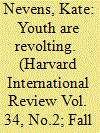

|
|
|
|
|
| Publication |
2012.
|
| Summary/Abstract |
On February 18, 2012, just over a year on from the first major demonstrations in Yemen's Change Square, 26-year-old photojournalist Ebrahim Al Sharif announced he was going to run for the presidency, under the banner "The First Youth President in the World."
|
|
|
|
|
|
|
|
|
|
|
|
|
|
|
|
|
|
|
|
|